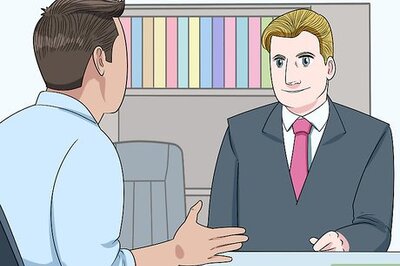
views

Ensure your own safety and those of any dependents with you. This is especially the case if you have come across a vehicle accident or you are in a place where there may be serious health and safety hazards present. If the deceased was found in the middle of a road, do not attempt to move the body to a safer location. Instead, stay with the person until the paramedics arrive, and signal to other commuters to divert around the scene. If the deceased committed suicide via electric shock, be mindful of any live currents that could potentially be fatal to you as well. If you find the deceased in the bath or similar location, having shocked themselves, it's best to wait outside of the house for professionals to arrive and remove the hazards.

Check the person. In some instances, people have found that their intuition was a little off, having discovered that the individual had only been unconscious or injured. Insure that you check for vital signs on the person to determine if the casualty is still living, and be prepared to perform resuscitation.

Call for paramedics. As soon as you have checked the person's vital signs (even if they are still living), contact your national emergency telephone number to have paramedics come and begin the process of handling the deceased. You may be in a highly emotional state, and the operator will be aware of that, just try as best as you can to tell them what's occurred and follow their guidance for possible life saving measures.

Survey the scene. While you wait for the paramedics to arrive, have a closer look at the entire setting and see if you can find any clues that match a possible cause of death. You're certainly not the case detective, but you can do your own research so that you can convey the information accurately to the professionals involved in the case. You might find that the individual had an asthma inhaler close by, was reaching for medication or in more cases than you would expect, they were in the bathroom. If the deceased committed suicide and/or are hanging (due to asphyxiation) or there is a copious amount of blood, avoid attempting to pull the body down onto the floor by yourself. Keep your distance and perhaps wait outside for the medical professionals or coroner to arrive and do their business. Avoid removing, shifting or touching any objects in the room or at the scene of the death - in case the coroner finds the tragedy as suspicious.

Acquaint with the paramedics. When the ambulance arrives, show them where you found the deceased person. They will do a medical examination to determine if the person is able to be recovered or if the individual has in fact passed away. You can help the paramedics out by conveying information to them about the situation, such as that they have an asthma inhaler in their right hand. Avoid taking charge of the situation and just let the professionals do their job.

Help the coroner. In most cases the paramedics will contact the coroner to do their examination and study the scene to determine if they believe the death was natural or suspicious. Help the coroner by conveying vital information about the deceased and answer any questions they may have about your discovery.

Notify immediate family and friends (if deceased is known). Once the body has been removed by a removal specialist and is on-route to either the morgue or hospital for storage, you can get in contact with immediate family and let them know what has happened. It's a very hard thing telling someone that they have lost a loved one, and even more so discovering someone having passed. Understand that you might still be in shock mode and it's okay to cry or react in whatever manner. There may be an opportunity for the family to visit the deceased at hospital if the body ends up being there. They can open up a room for you or your family to visit and say their farewell prior to the funeral service.

Contact a funeral home. It's a traumatic experience discovering a deceased individual and especially if they were a loved one, however, there are a handful of people in the world that provide a service that is there in the most disturbing times like this. Get in contact with a local funeral director and organize a time for you and or a few immediate relatives to attend a funeral arrangement conference where you discuss possible avenues to take when it comes time for either burial or cremation. If the deceased person is a relative and has life insurance, these funds can be accessed by the next-of-kin for the funding of the funeral. The deceased may also be entitled to a work and income funeral grant or other financial assistance.

Grieve. Finding a loved one having passed, or an individual who has died, is a highly emotional ordeal and the only way the process of recovery can truly begin is if you are respondent to grieving and have a good cry when you feel prompted. Don't hold back, let the emotions flow. Attend or join a local support group to help you through your grieving process. Remember, you’re not alone.




















Comments
0 comment